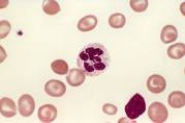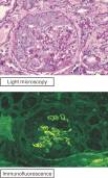Exam 10: Hypersensitivity-And-Autoimmunity
Exam 1: T-Cell-Mediated-Immunity8 Questions
Exam 2: Tumor-Immunity6 Questions
Exam 3: Tolerance13 Questions
Exam 4: Microbial-Immunity12 Questions
Exam 5: MHC9 Questions
Exam 6: Lymphocyte-Development11 Questions
Exam 7: Innate-Immunity12 Questions
Exam 8: Immunodeficiency-Diseases12 Questions
Exam 9: Immediate-Hypersensitivity10 Questions
Exam 10: Hypersensitivity-And-Autoimmunity11 Questions
Exam 11: General-Properties-Of-The-Immune-System6 Questions
Exam 12: Cytokines17 Questions
Exam 13: Cells-And-Tissues12 Questions
Exam 14: B-Lymphocyte-Activation11 Questions
Exam 15: Antigen-Receptors14 Questions
Exam 16: Antigen-Processing10 Questions
Exam 17: Antibody-Immunity10 Questions
Exam 18: Antibodies10 Questions
Exam 19: Transplantation13 Questions
Select questions type
The most commonly identified alleles that are associated with risk for autoimmune diseases encode which type of the following proteins?
Free
(Multiple Choice)
4.8/5  (37)
(37)
Correct Answer:
D
Which of the following statements about immune complex-mediated diseases is NOT true?
Free
(Multiple Choice)
4.8/5  (42)
(42)
Correct Answer:
C
Which type of hypersensitivity disease is caused by deposition of antigen-antibody complexes in blood vessel walls?
Free
(Multiple Choice)
4.8/5  (31)
(31)
Correct Answer:
C
For each of the clinical scenarios in questions ,choose the hypersensitivity type (A-D)that best matches the associated immunologic disease.(Answers may be used more than once. )
-A 5-year-old girl is taken to the emergency department with lethargy ,confusion ,vomiting,abdominal pain ,and flushed skin that is warm to the touch.Respirations are fast and shallow and emanate a strong,fruity odor.The mother notes that the child has been excessively thirsty over the past week and that she began wetting her bed during naps.Urine dipstick testing reveals markedly elevated levels of glucose and ketones.
(Multiple Choice)
4.9/5  (39)
(39)
All of the following are effector mechanisms of antibody-mediated disease EXCEPT:
(Multiple Choice)
4.9/5  (36)
(36)
For each of the clinical scenarios in questions ,choose the hypersensitivity type (A-D)that best matches the associated immunologic disease.(Answers may be used more than once. )
-A 60-year-old man is evaluated for shortness of breath,lightheadedness,diarrhea,abdominal pain,and tingling in his fingers and toes.A blood smear from the patient is shown in the figure.Antibodies to intrinsic factor are detected in his serum.

(Multiple Choice)
4.8/5  (36)
(36)
For each of the clinical scenarios in questions ,choose the hypersensitivity type (A-D)that best matches the associated immunologic disease.(Answers may be used more than once. )
-A 23-year-old medical student is taken to the emergency department because of diffuse facial erythema (redness),tightness of the chest,and difficulty breathing.He reports that the symptoms began shortly after he ate a shellfish dinner at a nearby Thai restaurant.On physical examination,he appears to be in acute distress with elevated heart rate and respiratory rate and a dangerously low blood pressure.He is treated with epinephrine.
(Multiple Choice)
4.9/5  (32)
(32)
The figure shows routine histologic and immunofluorescence images of a kidney biopsy specimen taken from a 53-year-old man with acute-onset renal failure and hemoptysis (coughing up blood).The histologic section is notable for glomerular inflammation in a crescentic distribution.Staining,using fluorescently tagged anti-IgG antibody,shows linear deposits of IgG along the glomerular basement membrane.Urinalysis is positive for moderate proteinuria and red cell casts.A chest radiograph shows pulmonary infiltrates.Which of the following is the most likely diagnosis? 
(Multiple Choice)
4.8/5  (30)
(30)
In which of the following disorders is the underlying pathogenic mechanism NOT due to antibody-mediated damage to cells or tissues?
(Multiple Choice)
4.8/5  (26)
(26)
For each of the clinical scenarios in questions ,choose the hypersensitivity type (A-D)that best matches the associated immunologic disease.(Answers may be used more than once. )
-A 29-year-old woman gives birth to an infant who is lethargic,jaundiced,and severely anemic and has an enlarged liver and spleen.The mother is RhD negative and the father is homozygous RhD positive.This is their second child.
(Multiple Choice)
4.9/5  (34)
(34)
Which of the following is NOT associated with increased relative risk of developing systemic lupus erythematosus?
(Multiple Choice)
4.8/5  (42)
(42)
Filters
- Essay(0)
- Multiple Choice(0)
- Short Answer(0)
- True False(0)
- Matching(0)